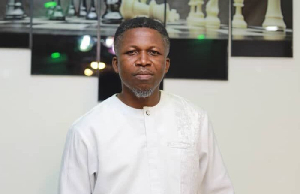Kumasi, Aug. 30, GNA - The Water Resources Commission (WRC) is to establish a water basin board to manage the water resources in the Lake Bosomtwe in the Bosomtwe-Atwima-Kwanwoma district. The Commission is currently seeking the assistance of the Asantehene, Otumfuo Osei Tutu 11, to impress on the chiefs and the district assemblies along the lake basin to support and take active part in the programme.
Professor Clement Dorm-Adzobu, Chairman of WRC, made this known at a meeting with Madam Patricia Appiagyei, Kumasi Metropolitan Chief Executive at her office in Kumasi on Wednesday.
The meeting was to brief the MCE on some of the initiatives being taken by the Commission to protect river bodies in Kumasi and seek the support of the assembly to ensure the successful implementation and management of the programmes.
Prof. Dorm-Adzobu said already three river basin boards had been established for integrated water resources management in the country. They are the Densu, Volta and Ankobra river basins.
He said the idea was to involve the local people, traditional leaders and the district assemblies as well as other stakeholders in the management and protection of river bodies in the country.
Prof Dorm-Adzobu said, so far the Ghana Water Company Limited (GWCL) had confirmed that the water quality in the Densu River had improve significantly since the establishment of the board three years ago and that the use of chemicals for treating the water had reduced. He said the Commission was much concern with the reported cases of pollution of river bodies in the Kumasi metropolis as a result of rapid industrial development and uncontrolled activities of residents. These activities coupled with the location of buildings and structures on waterways had frustrated the efforts of the Commission to protect river bodies in the city.
Prof Dorm-Adzobu however, said the Commission was reinforcing its commitment to manage water resources in Kumasi and the Ashanti region as a whole and said the Commission was counting on the support of the assembly and the Environmental Protection Agency (EPA) in the mobilization of human and material resources to achieve the objectives. Madam Appiagyei, on her part said the issue of water pollution and construction of structures on river courses had been a big problem in the metropolis.
She said the assembly's effort at protecting rivers in the city had always been frustrated by some chiefs who sold lands along river courses to private developers for construction of residential and other buildings.
She said the assembly lacked manpower and resources to control the wanton development in the metropolis, while it was also very expensive to pull down structures on waterways. Madam Appiagyei therefore suggested the institution of a massive and sustained education to enable residents know the implications of their actions.
The MCE hinted that the assembly was planning to meet the Kumasi Traditional Council to discuss the problem and come out with suggestions that would help prevent chiefs from selling lands along river bodies. Madam Appiagyei said the assembly with the support of the World Bank was dredging and widening the Susan River to ensure that the water flowed smoothly and appealed to residents to desist from throwing and garbage into rivers in the city.
General News of Wednesday, 30 August 2006
Source: GNA












